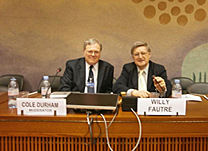Side Event about Human Rights in Russia at the UN in Geneva – 29 April 2013

“Unprecedented Repression of Religious Minorities and NGOs in Russia” was the subject of a two-hour side-event organized by Human Rights Without Frontiers Int’l (HRWF Int’l), the International Association for Religious Freedom (IARF) and the David M. Kennedy Center for International Studies (KCIS) at the United Nations in Geneva on 29 April 2013.
This event focused on recent, unprecedented human rights violations in Russia, particularly where religious liberty is concerned. The meeting was scheduled to take place on the day that the Russian Federation was being reviewed by the United Nations’ Universal Periodic Review (UPR), the mechanism used by the Human Rights Council to review the human rights record of individual member states. Side Events, also known as parallel events, are meetings that take place alongside or in conjunction with the larger formal events such as the UPR and the Human Rights Council. These are formal meetings that attract state delegations, NGO representatives and invited guests who come from all over the world. The Side Events are organized for the express purpose of sharing experiences, highlighting concerns, and increasing opportunities for informal dialogue and relationship building among meeting participants.
“Unprecedented Repression of Religious Minorities and NGOs in Russia” featured Professor Cole Durham of Brigham Young University, USA as moderator, with Willy Fautré, chairman of Human Rights Without Frontiers International (HRWF Int’l) in the role of panel organizer. The other panelists were: Alexander Verkhovsky from the Sova Human Rights Centre, Russia; Patricia Duval, Human Rights Attorney from France; and Vladimir Kuropyatnik from Russia, who read remarks prepared by Sergey Ivanenko, a Russian expert in Religious Studies who was unable to attend because he couldn’t get a visa. The event was well attended with just over 100 individuals entering the room and approximately 70 staying throughout the session. Uncommonly impressive was the range of state delegations that were represented, 21 including some interns, indicative of the concern and interest in the topic. The presidents of the several NGO committees in which the Kennedy Center has active membership were also present (FORB, HREL, DEVCOM, and CSVGC).
Report by Human Rights Without Frontiers